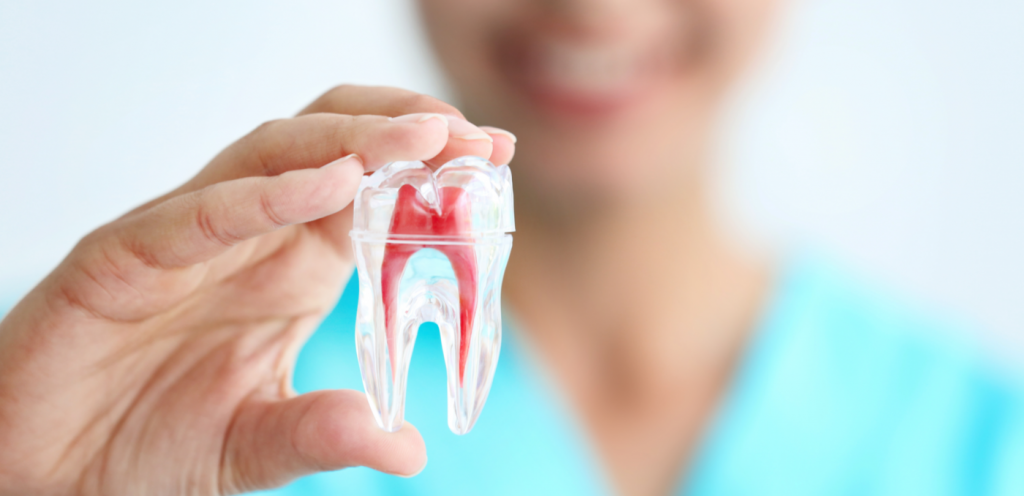ROOT CANAL RESEARCH
October 21, 2019

Patients often ask about whether there are any new technologies on the horizon, or currently in use, to help with different dental problems. There are many concepts being developed that could revolutionize the way care is delivered. My favorites are those that help prevent things, such as root canals.
Many people have felt the jolting sensation of a sharp pain in a tooth after drinking cold beverages. A tooth is made up of tubules, microscopic channels that extend from the inner layer of tooth called dentin, all the way to the center of the tooth containing the nerve. The sensation comes from the temperature travelling through open tubules, either from damaged dentin caused by decay or exposed dentin from recession of the gums.
If the sensation goes away in a split second the diagnosis is called reversible pulpitis (inflammation in the nerve of the tooth). If the pain lingers for more than a few seconds the diagnosis may be irreversible pulpitis and the treatment sometimes requires a root canal procedure to remove the damaged nerve.
Research being conducted at the University of Maryland School of Dentistry could provide dentists with a much less invasive treatment for pulpitis. Researchers are developing a new, patent-pending technique to deliver medication directly to the center of a tooth. The technique uses strong magnetic fields to move microscopic particles through the tooth’s dentin and into the pulp.
The research uses the tubules of the tooth as a vehicle to deliver medication that could reduce inflammation or treat infection. The technique would attach medication to nanoparticles. By creating the nanoparticles out of a magnetic substance, such as iron, the researchers can use a magnetic field to push those particles, and the attached medication, through the tubules and into the pulp.
Delivering steroid medication using these magnetic nanoparticles could treat inflammation in the pulp. An antibiotic could also be delivered to reduce the infection, or a local anesthetic could be used to anesthetize a tooth.
The research has shown that, even though the nanoparticles are tiny, they are able to deliver a large enough dose for medications to be effective. Studies are currently being conducted on extracted human teeth to determine the optimal size for the nanoparticles and the most effective biocompatible coating. By covering the particles with a biocompatible substance, starch for example, the body’s immune system won’t attack the nanoparticles.
Dentists have been treating inflammation of the pulp the same way for a long time, which is to remove the pulp of the tooth. When the pulp of the tooth is removed, the space the nerve occupied has to be filled with a material to prevent bacterial growth. Although effective, this devitalizes the tooth and comes with its own set of potential problems over time. These problems include a weakened tooth with a higher potential for fracture, as well as a much higher risk for recurrent infection.
This new research is a possible contemporary solution to an age-old problem. By delivering medication directly to the area of the tooth that gives the tooth its vitality, it could prevent the need for many root canals.
Dr. St. Clair maintains a private dental practice in Rowley and Newburyport dedicated to health-centered family dentistry. If there are certain topics you would like to see written about or questions you have please email them to him at jpstclair@stclairdmd.com. You can view all previously written columns at www.jpeterstclairdentistry.com/blog.
No Comments
No comments yet.
RSS feed for comments on this post.
Sorry, the comment form is closed at this time.







